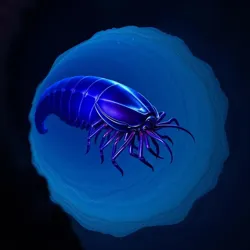Giant Amphipod
The Giant Amphipod (Gigantus obscurus) is a colossal species of deep-sea crustacean discovered in the Midnight Trenches at depths exceeding 8,000 meters. Unlike their smaller relatives, these remarkable creatures can grow to lengths of 2-3 meters, making them among the largest known amphipods in the world.
 A Giant Amphipod photographed near active hydrothermal vents in the Midnight Trenches
A Giant Amphipod photographed near active hydrothermal vents in the Midnight TrenchesPhysical Characteristics
Giant Amphipods possess several unique adaptations that set them apart from conventional amphipods. Their exoskeleton contains high levels of pressure-resistant minerals, allowing them to withstand the extreme conditions of the hadal zone. Their distinctive purple-black coloration comes from specialized chromophores that help them absorb what little light reaches these depths.
Behavior and Ecology
These creatures are primarily scavengers, using their enhanced chemoreceptor organs to detect food particles from several kilometers away. They exhibit unique social behaviors, often gathering in groups of 3-5 individuals around thermal seeps, where they engage in complex territorial displays.
Discovery
The first documented encounter with a Giant Amphipod occurred during the Benthos Initiative in 2021, when a deep-sea drone captured footage of multiple specimens feeding on a fallen Pressure Whale carcass. Since then, scientists have documented approximately 30 individual sightings.
Research Significance
The discovery of the Giant Amphipod has led to several breakthrough findings in deep-sea biology:
-
Evidence of gigantism evolution in extreme depths
-
New understanding of pressure adaptation mechanisms
-
Insights into deep-sea bioluminescent communication
Conservation Status
While their population numbers remain unknown, Giant Amphipods face potential threats from deep-sea mining operations and changes in ocean chemistry due to climate change. The Abyssal Conservation Society has listed them as a species of special concern.
See Also
- Trencher's Maw
- Midnight Trenches
- Hadal Gigantism
- Deep Sea Scavenger Network
References
- Journal of Hadal Biology
- Deep Sea Cryptid Registry
- Abyssal Species Catalog